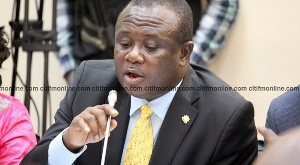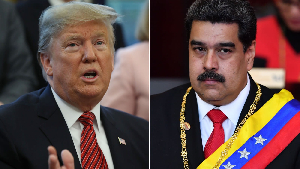The First Deputy Speaker of Parliament, Joe Osei-Owusu, has described as narrow-minded, arguments against the mandatory towing fee for all vehicle owners, which will be paid to the owners of Zoomlion Waste Management Company, with the state getting next to nothing, in a scheme which empowers the Ghana Police Service, to be at their extortion best to secure 5 percent of the sum collected for Zoomlion.
The insults by Joe Osei-Owusu, former Chief Executive Officer of the Driver and Vehicle Licensing Authority (DVLA), was reaction to calls by the public for the law to be scrapped, as it amounts to daylight robbery.
As boss of DVLA, Osei-Owusu, championed and got the roadworthy responsibility under the Authority privatized, putting money in the pockets of private individuals, who could build and acquire licenses for that purpose.
The privatization process, denied the state-owned DVLA its revenue base, as it only get a paltry sum from the private garages.
He is again championing this venture for Zoomlion’s Road Safety Management Services Limited (RSMSL) to cream money from the poor taxi drivers, Trotro drivers and other car owners, into deep pocket individuals, who will push any agenda no matter the cost, so long as their financial interests prevail.
In a Citi News interview, Mr. Osei-Owusu, who readily uses insults and strong language in making his points, argued that, the policy was in the supreme interest of road users, after research showed that a huge number of road accidents are caused by broken down vehicles.
The National Road Safety Commission (NRSC) was expected to begin a nationwide towing programme in July 2017, to ensure that all vehicles that breakdown on highways are cleared off the roads. For this reason, drivers were required to pay a road safety fee ranging between GH¢10 and GH¢200 in addition to their road worthy certification fees.
Commercial vehicles and taxes will pay GH¢40, mini buses will pay GH¢80, while heavy duty trucks will pay between GH¢80 and GH¢200 annually, depending on their tonnage. Non-commercial vehicles are expected to pay GH¢20. The Road Safety Management Services Limited (RSMSL) has already acquired some 118 trucks ahead of the implementation, for the exercise.
But several persons, have kicked against the policy calling on government to scrap it immediately. A former President of the Ghana Institution of Engineers (GhIE), Ing. Magnus Lincoln Quarshie, says the approach is a total rip-off.
But Osei-Owusu, insisted in an interview with Citi News’ Duke Mensah Opoku that, the counter arguments are not tenable.
“Your car may never have to be towed but you can run into a vehicle that is disabled. Sometimes we are just parochial; we discuss the issue only on one side. What you are discussing is not your vehicle; it is the risk to road users. The risk that a broken down vehicle possesses is not to only the driver but to everyone who plies the road,” he stated.
He urged that the arguments should revolve around the dangers that such broken down vehicles could cause to human lives.
“Anytime there is a disabled vehicle on the road, there is a risk to the life of every road user. So if we don’t focus on removing the risk to the road and we focus on how much will it cost, who is doing the work, we’ll be missing the problem. It’s my vehicle that has broken down, and during the time, I don’t have money and it will genuinely happen to many people.”
The 1st Deputy Speaker, who was a lead discussant during the formulation of the policy in 2011, said initially the policy was to charge only heavy duty truck owners, but it was later extended to other categories of vehicles in order to create a pool of funds for undertaking such programme.
“When it comes to the heavy duty truck owners that were the main reason we changed the rule to making a contribution to a pool; because they explained legitimately that they carry the load, but they are not paid. The charges are paid to their owners so anytime they are on the road they have small amount of money for their personal expenses. When you observe, anytime those vehicles break down, you find that their owners come with mechanics because the drivers are not holding the money there. So if you leave it to them, the disabled vehicles will not be towed and other road users’ lives will be in danger,” he added.
“In 2011, every stakeholder was involved. All the driver unions in Koforidua, where we finalized the document were involved. Myself and Osei Prempeh were the lead discussants. All the driver unions were represented. At the time, the controversy was whether to pay the entire amount to the operator or hold it and pay when they discharge services. Your car may never have to be towed but you can run into a vehicle that is disabled,” he reiterated,
Meanwhile, the Roads and Transport Committee of Parliament, is currently locked up in a meeting with the Road Safety Commission, the DVLA and other stakeholders over the matter.
According to the Ranking Member on the Committee, Governs Kwame Agbodza, the committee wants to probe the issues surrounding the implementation and possibly recommend the recall of the Legislative Instrument supporting the fee.
Some MPs, including the Deputy Minority Leader, James Avedzi Klutse, had earlier called for the policy to be scrapped, following the reactions.
But Osei Wusu, said the critics lack understanding of the issue.
“That is what politicians do; jumping on bandwagon…sometimes I think that some politicians are too hasty. If you ask them to go deep into the matter, they have not even considered all the issues. As far as I’m concerned it is a risk to everybody.”
Government has in the meantime, put on hold the implementation of the law that mandates vehicle owners to pay an annual mandatory towing levy.
Deputy Transport Minister, Daniel Nii Kwatei Titus-Glover, explained that the Ministry, listened to the plights and cries of Ghanaians, which culminated into suspending the law.
Passed in 2012, the LI 2180, was given five years fallow period, after which it would jump to life in 2017. With two weeks to its implementation, the new regulation, has been met with public disapproval.
Mr. Titus-Glover, disclosed to Evans Mensah on Newsnite programme on Monday that, the decision was to allow stakeholder engagements to address all the issues being raised regarding the policy.
“In principle, the issue about lives that are being lost on our major roads as a result of the broken down vehicles that have been on the road for days killing innocent people is of grave concern to the ministry.
He explained that when the issue made headlines that the NRSC was starting the service on Republic Day, July 1, it was received with lots of public outcries and criticisms.
“So the Minister came out to inform the public that he has asked them [NRSC] to put it on hold. Then today, he formally came out to say that they should put it on hold.
“This is because we realised there has not been enough stakeholder consultation with regards to the service,” he said.
The Tema East Parliamentarian, assured that people should look at the bigger picture of the Ministry concerned with saving lives on the roads.
He said, the concept which the Akufo-Addo government inherited “is a very brilliant idea, but if the very people whose lives are to be saved are saying they are not very comfortable with it, the Minister must listen to them and review, if possible.”
Mr. Tuitus-Glover, said the law was likely to be reintroduced after extensive stakeholder consultation, because the priority is saving lives from the unnecessary accidents and dangers broken down vehicles pose on the roads.
General News of Friday, 23 June 2017
Source: theheraldghana.com













